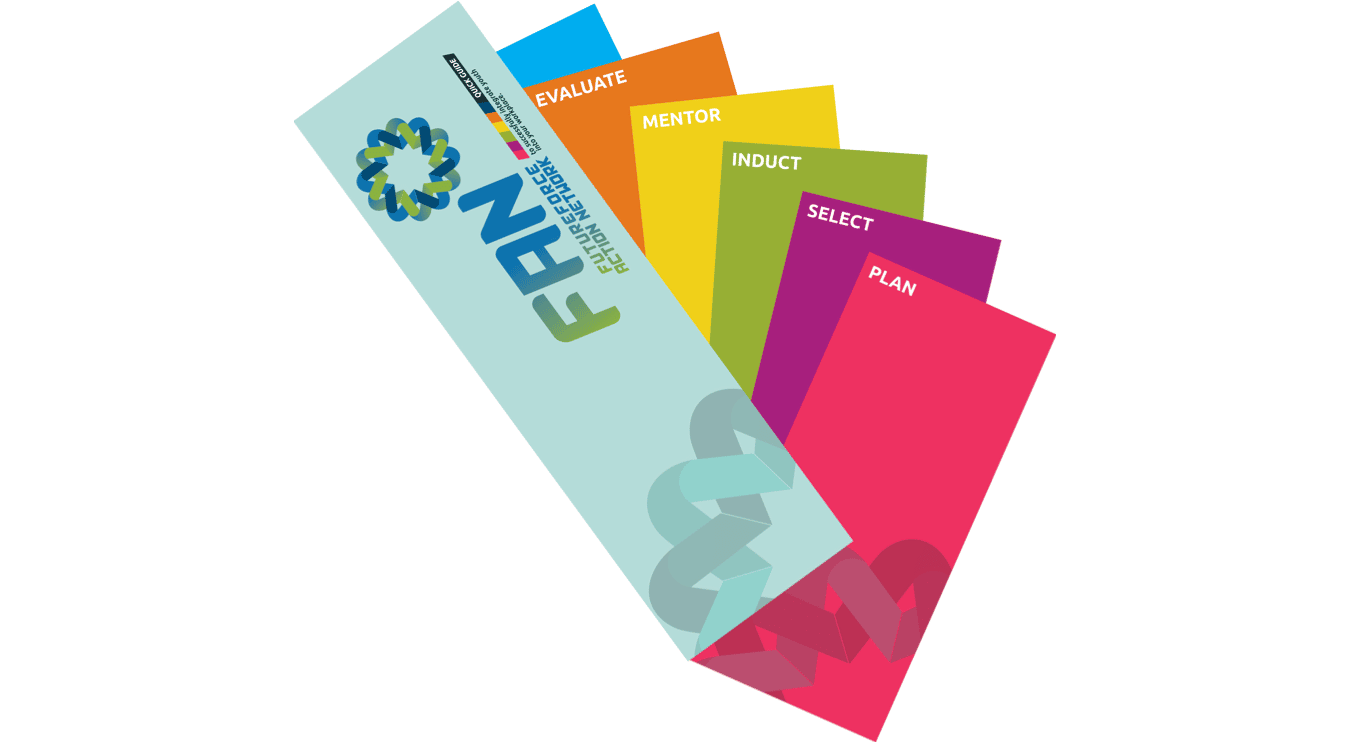Welcome to FAN!
FutureForce Action Network (FAN) is the ground-breaking initiative equipping employers to more effectively incorporate young people into the workplace.
FAN resources have been developed specifically for employers outlining excellent HR methods for effectively transitioning youth into the workplace via work experience, apprenticeships, internships, cadetships and jobs.

Types of Opportunites
Work Experience
Apprenticeship
Cadetship
Employment
Internship

Work Experience
Work experience is a limited period of unpaid work placement in an organisation to enable young people to get a feel for a particular type of work and/or professional working environment.
Minimum Actions for getting involved:
- Contact a secondary school Gateway Coordinator/Career’s Advisor or tertiary provider connected with your industry and let them guide you through the process.
- For tips on creating a mutually beneficial experience, read FAN Work Experience.
Benefits to Employers:
- Recruitment strategy – marketing your industry as attractive, and your business as an employer of choice, identifying the ‘stars’, building networks to fill future employment needs.
- Development strategy – developing training, communication and management skills of current staff through mentoring – especially those earmarked for promotion.
- Employee engagement – organisations invested in developing youth through work experience/mentoring programmes have reported increased employee engagement (which is linked to productivity, performance and organisational commitment amongst other benefits).
- Access to fresh thinking, ideas and innovation.
- Have a hand in developing the skills of youth to get them work-ready as employees of the future.
- Community service and involvement makes an organisation visible in the community (marketing), enhances organisational image and reputation (employer and goods/service provider of choice) and increases employee engagement to the organisation (employee morale is up to three times higher in firms actively involved in the community compared to those that are not).

NB: The above resources are intended only as an example and not as a substitute for independent legal advice. Example salaries/wages may not be up to date with current legislation, please check the Employment New Zealand website for up to date minimum and training wage rates.
Cadetship
Cadetships combine employment and tertiary study or formal on-the-job training but are not tied to a government-led framework and are negotiated between an employer and employee.
Minimum Actions for getting involved:
- Read FAN Cadetship
Benefits to Employers:
- Staffing strategy – particularly where a full-time or permanent employee is not currently needed but anticipated in the future, or where work is seasonal. Work hours can be negotiated and adapted to fit changing business needs while simultaneously developing and growing your workforce to meet future needs.
- Retention strategy – Cadetships are a great way to invest in a potential young star and support them with their studies while retaining their talent in the organisation. Cadetships are also ideal for seasonal industries where Cadets can work full-time during the busy season and study during the off-season – eliminating the need to re-recruit for the following on-season.
- Employee engagement – the cadet is motivated by credit achievement to actively learn practical skills that they can then bring into your workplace
- Access to fresh thinking, ideas and innovation – learning gained from formal classes can benefit the business when applied in practice. It can also generate conversations about ‘the way things are done around here’ that may identify issues and solutions not previously considered.
- Have a hand in developing the right skills to meet your business needs.
NB: The above resources are intended only as an example and not as a substitute for independent legal advice. Example salaries/wages may not be up to date with current legislation, please check the Employment New Zealand website for up to date minimum and training wage rates.
Internship
An intern is student undergoing supervised, practical training or experience in a workplace environment for an agreed period of time. Internships can be paid or unpaid.
Minimum Actions for getting involved:
- Contact a tertiary provider connected with your industry or a secondary school Gateway Coordinator/Career’s Advisor and let them guide you through the process.
- For tips on creating a mutually beneficial internship experience read FAN Internship.
Benefits to Employers:
- Staffing strategy – an internship is an ideal way to get an extra pair of hands during busy periods. It is also an ideal format for project work. An intern can contribute to an on-going work project or a discrete project that starts and ends with the internship experience.
- Recruitment strategy – marketing your industry as attractive and your business as an employer of choice, identifying the ‘stars’, building networks to fill future employment needs.
- Access to fresh thinking, ideas and innovation from enthusiastic young people who can bring the latest knowledge and techniques into your workplace.
NB: The above resources are intended only as an example and not as a substitute for independent legal advice. Example salaries/wages may not be up to date with current legislation, please check the Employment New Zealand website for up to date minimum and training wage rates.
Apprenticeship
Apprentices combine work with formal study to earn their qualifications under the NZQA framework. Apprenticeships are subsidised by the government and must meet several criteria to be approved. Apprenticeships are now available in most industries.
Minimum Actions for getting involved:
- Contact your industry’s Industry Training Organisation (ITO).
- For tips on creating a mutually beneficial apprenticeship experience read FAN Apprenticeship.
Benefits to Employers:
- Apprenticeships are ideal for small businesses with limited training budgets and provide access to industry training organisation support. In addition to on-the-job training, an apprenticeship enables a young person to formally learn relevant skills they can then bring into the workplace. For a family business an apprenticeship also provides an independent training platform that can hold more weight than “just mum or dad telling me”. Formal learning independent of the business can fill training gaps caused by ‘implicit knowledge’ held by the on-the-job supervisor.
- Development strategy – developing the career path of young employees and enabling them to gain a qualification that can be useful at any time in life.
- Employee engagement – the apprentice is motivated by endeavouring to upskill and attain a recognised formal qualification.
- Access to fresh thinking/ideas/innovation – learning gained can benefit the business when applied in practice. It can also generate conversations about ‘the way things are done around here’ that may identify issues and solutions not previously considered.
- Have a hand in developing the right skills for youth to meet your business needs. If literacy and/or numeracy skills of the apprentice are not sufficient to be effective in the workplace, the apprentice may be eligible for up to 30 hours of support through Literacy Aotearoa. Funding may also available to help apprentices struggling with advanced/life skills such as oral communication, IT skills, planning and organising skills, problem solving skills, learning skills and ability to function in the workplace (e.g. teamwork).
- The Government Apprenticeship Boost Scheme is currently offering employers $500 per month, per apprentice for apprentices engaged in a New Zealand Apprenticeship or Managed Apprenticeship. These apprenticeship programmes must be approved and run by the Tertiary Education Commission (TEC) and be run by and Industry Training Organisation (ITO), Te Pūkenga (also known as New Zealand Institute of Skills Technology), a Wānanga, or a registered Private Training Establishment (PTE). For full terms, conditions and information, visit Work and Income
Apprenticeship Boost is available until the end of December 2023.
NB: The above resources are intended only as an example and not as a substitute for independent legal advice. Example salaries/wages may not be up to date with current legislation, please check the Employment New Zealand website for up to date minimum and training wage rates.
Employment
Employment is casual, part-time, full-time or fixed term paid work.
Minimum Actions for getting involved:
- Read FAN Employment
Benefits to Employers:
- Recruitment strategy – access an untapped talent pool of young people to fill your business needs and the opportunity to train a ‘blank slate’ employee in the ways you like to operate.
- Staffing strategy – Work hours can be negotiated and adapted to fit changing business needs while being flexible around the young person’s other commitments.
- Access to fresh thinking, ideas and innovation. Gain a better understanding of the youth market/your future customers.
- Have a hand in developing the right skills for youth to meet your business needs.
NB: The above resources are intended only as an example and not as a substitute for independent legal advice. Example salaries/wages may not be up to date with current legislation, please check the Employment New Zealand website for up to date minimum and training wage rates.
